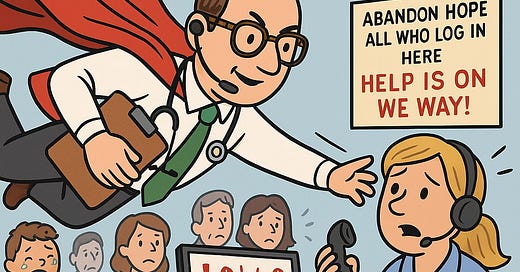Troubleshooting Total Triage: Solutions for Common Implementation Challenges
Growing pains and how to deal with them!
As the Efficient GP, I've worked with numerous practices implementing the total triage model - where a clinician is embedded with reception staff during patient calls. While the benefits are substantial, the transition isn't without challenges. Recently, a practice that implemented this system about a year ago reached out with some common issues they're facing. I thought their questions and my responses might be helpful for others on this journey.
The Growing Pains of Successful Triage
This practice has been running their triage system for nearly a year. Like many, they've mastered the fundamentals but continue to refine the process. They identified five key challenges:
Length of call queues
Time reception staff spend on individual calls
Variation in GP approaches (appointments vs. immediate resolution vs. signposting)
Patient complaints about the system and access
Difficulties for vulnerable patient groups
Sound familiar? These are common challenges that most practices face when implementing total triage. Let me share some practical solutions we've discovered.
Reducing Call Queue Length and Call Duration
The "therapeutic wait" (where patients self-select whether their issue is important enough to wait on hold) has some value in a system without charges, but it's far from ideal and can lead to frustrated patients. Here are more effective approaches:
Focused training sessions for reception staff on streamlining history-taking
Increased online triage options (though this can be controversial as some fear it increases demand) leaving lines free for those less able to cope with new technology
Specialised pathways for common issues through your practice website - think vasectomy requests, contraceptive issues, HRT renewals, and other predictable requests where a set of answered questions allows more efficient processing
Managing Clinical Variation
Variation in how clinicians handle similar cases is perhaps the most challenging aspect to address. The most effective solution I've found is regular collaborative meetings bringing together clinicians and reception teams.
Use these meetings to:
Review specific scenarios where reception staff observe inconsistent approaches
Develop consensus protocols for common situations
Share best practices and refine the system based on real experience
These conversations create alignment without restricting clinical judgment and help reception staff develop a better understanding of when differences in approach are appropriate.
Addressing Patient Concerns
Patient complaints often stem from two sources: legitimate access challenges and misunderstanding of how the system works.
For the access challenges:
Be transparent in your messaging about funding constraints alongside increasing demands from hospital waiting lists, demographics, etc.
Consider explaining the BMA's safe working limits while being clear about why they're necessary to avoid unsafe care
For improving understanding:
Update your phone message to explain the triage process while patients wait
Create a short video for your practice website or social media explaining how your system works - lack of understanding of what is going on behind the scenes is the biggest cause of concerns and complaints. You can also demonstrate how the system ensures people get the most appropriate care in the shortest possible time
Supporting Vulnerable Patients
Your telephone system may allow you to identify and prioritise access for vulnerable cohorts. This ensures they're not waiting as long for assistance. Some practices have done excellent work on identifying vulnerable groups and creating specialised pathways for them.
The Ongoing Journey
No triage system is perfect, but the beauty of this approach is its adaptability. The techniques used to develop the model allow practices to remain flexible and adapt as circumstances change - as we've all had to do repeatedly since the pandemic.
Even a year in, you should expect to continue refining your approach. Regular review sessions where staff can raise issues and suggest improvements keep the system evolving rather than stagnating.
Final Thoughts
What I most appreciate about the practice that sent these questions is their commitment to continuous improvement. They recognize that implementing total triage isn't a one-time event but an ongoing process. Their system is working well overall, but they're not settling for "good enough."
That mindset - of constant refinement and adaptation - is what separates truly exceptional practices from the rest.
Have you implemented a similar system? What challenges have you encountered, and how have you addressed them? I'd love to hear your experiences.
If you found this helpful, please subscribe to my newsletter for more Efficient GP tips and tricks, or share this with colleagues who might be implementing similar systems in their practice.





